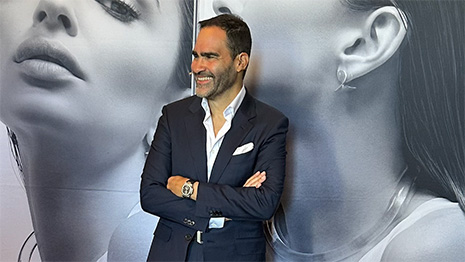 Daniel Langer is the founder and CEO of consulting firm Équité
Daniel Langer is the founder and CEO of consulting firm Équité
In today's challenging luxury reality, where many brands struggle to be relevant and create enough perceived value, sales becomes the critical enabler.
Coming fresh out of a luxury sales masterclass that I was leading with one of the most successful ultra-luxury brands, the notion that luxury brands sell themselves is a dangerous misconception. The truth is, even at the top, creating desirability requires significant effort, strategy, and most importantly, emotional intelligence.
As I've observed time and time again in my strategy projects and luxury masterclasses, the ability to sell through emotion is a rare and invaluable skill – one that will make or break a brand's success.
Predicting the future success of luxury brands
The best brands in the world know that and invest disproportionately into sales excellence, while brands that lag behind often cut corners.
The 4E of luxury framework I have been publishing extensively about – Emotion, Exclusivity, Experience and Engagement – offers a comprehensive approach that can transform the way luxury brands connect with their discerning clientele.
In a recent keynote presentation to the top luxury investors during a conference in Hong Kong, I stressed that assessing the implementation of the 4E is a great way to predict the future success of luxury brands. However, implementing this framework is not without its challenges. Let's explore three typical hurdles faced by luxury sales professionals and how the 4E framework can help overcome them.
Understanding and identifying the emotional key of clients is perhaps the most critical challenge in luxury sales. Many salespeople struggle to move beyond product features, failing to tap into the deeper aspirations and desires that drive luxury purchases.
For instance, a client browsing a high-end watch collection may not be looking for a timepiece, but rather a symbol of personal achievement or a legacy to pass down to future generations. The emotional key here isn't about precision or craftsmanship – it's about legacy and personal significance.
The 4E framework, particularly the Emotion component, reminds sales professionals to focus on storytelling that resonates with the client's values and dreams. A client who loves the design of a watch will not resonate with long explanations of complications and vice versa.
Important is to understand what drives a person, identify their emotional world and then connect on a personal level.
Brand storytelling in luxury
Brand storytelling presents another significant challenge. Translating the brand's heritage and values into a compelling narrative that speaks directly to each client is an art form that many brands struggle to master.
Consider a scenario where a client is interested in a luxury fashion brand's latest collection. Simply reciting the designer's accolades or the materials used isn't enough.
The salesperson needs to weave a narrative that connects the brand's values with the client's lifestyle and aspirations. The Experience and Engagement elements of the 4E framework are crucial here, encouraging sales professionals to bring the brand story to life in a way that's relevant to each client.
Perhaps the most daunting challenge is providing exceptional experiences consistently. In luxury, a single underwhelming experience can break a carefully cultivated relationship.
The result is literally a breakup. I've seen numerous mystery-shopper results where clients were underwhelmed by the store experience, despite the staff being friendly.
The mistake is often in focusing too much on the transaction and not enough on creating a memorable moment.
Road to excellence
The 4E framework, particularly the Experience and Exclusivity components, provides a roadmap for consistently exceptional service. Implementing the 4E framework requires a holistic approach to client interactions.
Luxury sales teams should focus on regular training sessions that hone emotional intelligence and storytelling techniques. A robust clienteling system is essential for tracking preferences and personalizing experiences.
Creating an "exclusivity calendar" of limited-time offers and events keeps clients engaged, while a continuous feedback loop helps refine the luxury experience. It's crucial to establish KPIs that go beyond mere sales figures, measuring emotional connection and engagement.
This comprehensive strategy ensures that every interaction becomes an opportunity to reinforce the brand's luxury positioning and create lasting value for the most discerning clients. Remember, luxury is, in its essence, pure emotion.
The brands that succeed are those that recognize and leverage the emotional triggers of their clients. They are the ones who understand that the art of selling luxury is the profound and personal connection between brand and client.
This is the emotional key that unlocks true luxury success, and its mastery is what separates the leaders from the followers in the pursuit of desirability. By embracing the 4E framework, luxury sales professionals can elevate their approach, inspiring clients and driving exceptional results in an increasingly challenging, competitive and rapidly changing market.
Luxury Unfiltered is a weekly column by Daniel Langer. He is the CEO of Équité, a global luxury strategy and brand activation firm. He is recognized as a global top-five luxury key opinion leader. He serves as an executive professor of luxury strategy and pricing at Pepperdine University in Malibu and as a professor of luxury at New York University, New York. Mr. Langer has authored best-selling books on luxury management in English and Chinese, and is a respected global keynote speaker.
Mr. Langer conducts masterclass management training on various luxury topics around the world. As a luxury expert featured on Bloomberg TV, Financial Times, The New York Times, Forbes, The Economist and others, Mr. Langer holds an MBA and a Ph.D. in luxury management, and has received education from Harvard Business School. Follow him on LinkedIn and Instagram.